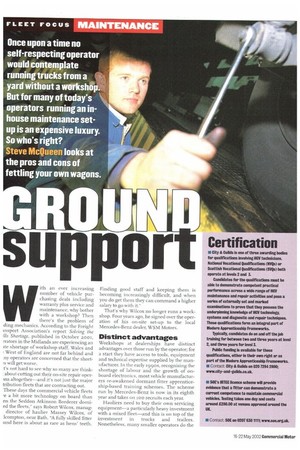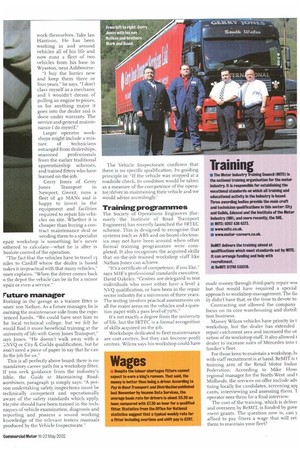lAr ith an ever increasing number of vehicle purchasing deals including
Page 34

Page 35

If you've noticed an error in this article please click here to report it so we can fix it.
warranty plus service and maintenance, why bother with a workshop? Then there's the problem of ding mechanics. According to the Freight insport Association's report Solving the ills Shortage, published in October 2001, .rators in the Midlands are experiencing an ite shortage of workshop staff. Wales and ; West of England are not far behind and .ny operators are concerned that the short!s will get worse.
t's not hard to see why so many are think. about cutting out their on-site repair °perms altogether—and it's not just the major tribution fleets that are contracting out. These days the commercial vehicle fleets ,e a bit more technology on board than en the Seddon Atkinson Borderer dornied the fleets," says Robert Wilcox, manag
director of haulier Massey Wilcox, of kompton, near Bath. "A fully skilled fitter und here is about as rare as hens' teeth. Finding good staff and keeping them becoming increasingly difficult, and when you do get them they can command a higher salary to go with it."
That's why Wilcox no longer runs a workshop. Four years ago, he signed over the operation of his on-site set-up to the local Mercedes-Benz dealer, WSM Motors.
Distinct advantages
Workshops at dealerships have distinct advantages over those run by the operator; for a start they have access to tools, equipment and technical expertise supplied by the manufacturer. In the early 19905, recognising the shortage of labour and the growth of onboard electronics, most vehicle manufacturers re-awakened dormant fitter apprenticeship-based training schemes. The scheme run by Mercedes-Benz is now in its eighth year and takes on too recruits each year.
Hauliers need to buy their own servicing equipment—a particularly heavy investment with a mixed fleet—and this is on top of the investment in trucks and trailers. Nonetheless, many smaller operators do the work themselves. Take Ian Harrison. He has been working in and around vehicles all of his life and now runs a fleet of two vehicles from his base in Wyaston, near Ashbourne.
"I buy the lorries new and keep them three or four years," he says. 'I don't class myself as a mechanic and I wouldn't dream of pulling an engine to pieces, so for anything major it goes into the dealer and is done under warranty. The service and general maintenance I do myself."
Larger operator workshops might include a mixture of technicians estranged from dealerships, seasoned professionals from the earlier traditional apprenticeship schemes, and trained fitters who have learned on-the-job.
Gerry Jones of Gerry Jones Transport in Newport, Gwent, runs a fleet of 40 MANs and is happy to invest in the equipment and facilities required to repair his vehicles on site. Whether it is cheaper than buying a contract maintenance deal or sending them to a specialist epair workshop is something he's never .othered to calculate—what he is after is bsolute control of the operation.
"The fact that the vehicles have to travel 13 niles to Cardiff where the dealer is based nakes it impractical with that many vehicles," ones explains. "When the driver comes back o the depot the vehicle can be in for a minor epair or even a service."
Future manager
Working in the garage as a trainee fitter is ones' son Nathan. As a future manager, he is earning the maintenance side from the expeienced hands. "We could have sent him to he local technical college, but we felt he sfould find it more beneficial training at the miversity of life with Gerry Jones Transport," rays Jones. "He doesn't walk away with a aNVQ or City 8.r. Guilds qualification, but he aron't need a piece of paper to say that he can io the job for us."
This is all perfectly above board; there is no mandatory career path for a workshop fitter. If you seek guidance from the industry's bible, the Guide to Maintaining Roadworthiness, paragraph 31 simply says: "A person undertaking safety inspections must be technically competent and operationally aware of the safety standards which apply. He/she should have been trained in the techniques of vehicle examination, diagnosis and reporting and possess a sound working knowledge of the relevant testers manuals produced by the Vehicle Inspectorate."
The Vehicle Inspectorate confirms that there is no specific qualification. Its guiding principle is: "If the vehicle was stopped at a roadside check, its condition would be taken as a measure of the competence of the operator/driver in maintaining their vehicle and we would advise accordingly."
Training programmes
The Society of Operations Engineers (formerly the Institute of Road Transport Engineers) has recently launched the I RTEC scheme. This is designed to recognise that systems such as ABS and on-board electronics may not have been around when other formal training programmes were completed. It also recognises the acquired skills that on-the-job trained workshop staff like Nathan Jones can achieve.
"It's a certificate of competence, if you like," says SOE's professional standards executive, David Oakeley. "Centres are delegated to test individuals who must either have a level 2 NVQ qualification, or have been in the repair sector industry for a minimum of three years. The testing involves practical assessments on all the major areas on the vehicles and a question paper with a pass level of 7o%."
It's not exactly a degree from the university of life, but the I RTEC is a formal recognition of skills acquired on the job.
Workshops dedicated to fleet maintenance are cost centres, but they can become profit centres. Wilcox says his workshop could have made money through third-party repair woi but that would have required a special approach to workshop management. The far ily didn't have that, or the time to devote to Contracting out allowed the company focus on its core warehousing and distril: tion business.
Massey Wilcox vehicles have priority in t workshop, but the dealer has extended repair catchment area and increased the ut sation of its workshop staff. It also allowed t dealer to increase sales of Mercedes into t haulier's fleet.
For those keen to maintain a workshop, hi with staff-recruitment is at hand. ReMIT is training arm of the Retail Motor Indus Federation. According to Mike How, regional manager for the North-West and i Midlands, the services on offer include ads tising locally for candidates, screening api cants, interviewing and assessing them. 1 operator sees them for a final interview:
The cost of the training, which is delive: and overseen by ReMIT, is funded by gove rnent grants. The question now is, can y afford to pay fitters a wage that will ret them to maintain your fleet?




























































































































































